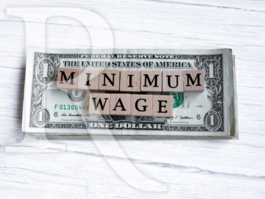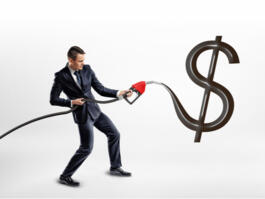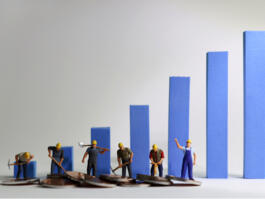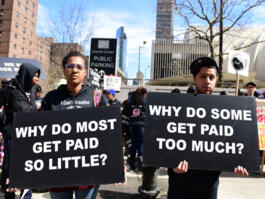How We Really Feel About Economic Inequality
A Commentary by Froma Harrop
Americans don't care much about rising economic inequality, recent surveys suggest. But that's not quite right.
The public may know that the top 10 percent pulled in about half of pretax income in 2012 -- and that income inequality is the widest it's been since right before the Great Depression. Its brain understands that these trends are not good for the society.
But Americans express far less concern about the U.S. income gap than do the French, Brits and Germans about theirs. Meanwhile, the ratio between the other countries' top 20 percent and bottom 20 percent is a fraction of ours. How do we explain these findings from a Pew Research Center study?
The numbers are probably solid, but the interpretation of them is tricky. It's not that most Americans regard growing income disparities as a non-problem. It's that they are more concerned about the "why" of them than the fact of them.
Ours is a work culture. We respect work. The emphasis on time devoted to the job may come with a price -- a less full personal and family life -- but it is good for the economy.
Americans look down on those deemed outside the work culture. And most such people are poor. The problem is seen as a broken work ethic rather than a frayed safety net or shifting economy.
One need not be a conservative to regard many in this group as lazy, preferring to milk various government programs (or relatives) rather than work a job. Some economists describe them in less judgmental ways -- as unable to respond to the economic incentives that drive the rest of us.
Whatever. Our perpetually unemployed population is growing as many able-bodied, willing-to-work people find themselves without salable skills. Often demoralized by the low pay, some stop trying and drift into the world of non-work.
But when struggling workers do get jobs, the American public stands behind them, and incomes become an issue. Exhibit A is the broad support for raising the federal minimum wage to $9 an hour, from the current $7.25.
Not surprisingly, 91 percent of Democrats are in favor, according to a Gallup poll. But more than half of Republicans surveyed, 58 percent, also back it, as do 76 percent of independents.
Of course, an actual hike in the minimum wage requires a vote of Congress, where fast-food outlets and other payers of low wages have considerable clout. In March, the Republican-controlled House voted against a bill that would have raised the minimum to $10.10 by 2015.
It's true that one cannot set the minimum wage at an unrealistically high level without loss of jobs or replacement of many workers with machines. But modest increases seem to have little effect on employment. It also helps to know that the minimum wage in 1968 was $10.77 in today's dollars. Adjusted for inflation, the minimum wage is now 33 percent lower than it was back then.
When speaking in vague terms about social programs, Americans and Danes reflect famously different views. But they're on the same page when it comes to aiding those who try, according to a study by two professors at Aarhus University in Denmark.
They presented this scenario: "Imagine a man who is currently on social welfare. He has always had a regular job, but has now been the victim of a work-related injury. He is very motivated to get back to work again."
There was virtually no daylight between Danes and Americans in describing the man as "unlucky" and deserving of help rather than "lazy."
Do Americans care about economic inequality? They do, but with asterisks attached.
Follow Froma Harrop on Twitter @FromaHarrop. She can be reached at fharrop@gmail.com. To find out more about Froma Harrop and read features by other Creators writers and cartoonists, visit the Creators Web page at www.creators.com
COPYRIGHT 2013 CREATORS.COM
See Other Political Commentary.
See Other Commentaries by Froma Harrop.
Views expressed in this column are those of the author, not those of Rasmussen Reports. Comments about this content should be directed to the author or syndicate.
Rasmussen Reports is a media company specializing in the collection, publication and distribution of public opinion information.
We conduct public opinion polls on a variety of topics to inform our audience on events in the news and other topics of interest. To ensure editorial control and independence, we pay for the polls ourselves and generate revenue through the sale of subscriptions, sponsorships, and advertising. Nightly polling on politics, business and lifestyle topics provides the content to update the Rasmussen Reports web site many times each day. If it's in the news, it's in our polls. Additionally, the data drives a daily update newsletter and various media outlets across the country.
Some information, including the Rasmussen Reports daily Presidential Tracking Poll and commentaries are available for free to the general public. Subscriptions are available for $4.95 a month or 34.95 a year that provide subscribers with exclusive access to more than 20 stories per week on upcoming elections, consumer confidence, and issues that affect us all. For those who are really into the numbers, Platinum Members can review demographic crosstabs and a full history of our data.
To learn more about our methodology, click here.



